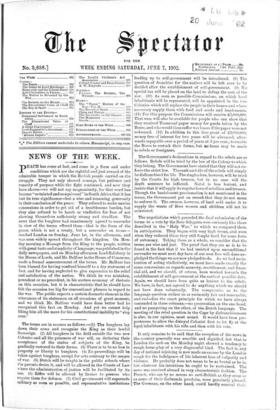NEWS OF THE WEEK.
PEACE has come at last, and come in ,a form and under conditions which are the rightful and just reward of the admirable temper in which the British people carried on the struggle. They not only showed courage, but patience and tenacity of purpose while the fight continued, and now they have shown—we will not say magnanimity, for that word has become "so tainted and so equivocal" in South Africa that it has lost its true significance—but a wise and reasoning generosity in their conclusion of the peace. They refused to make unwise concessions in order to get rid of a troublesome burden, but they also refused to be harsh or vindictive for fear of not showing themselves sufficiently strong and steadfast. The news that the burghers had unanimously agreed to surrender in view of the terms offered them—that is the form of the peace, which is not a treaty, but a surrender on terms— reached London on Sunday, June 1st, in the afternoon, and was soon widely spread throughout the kingdom. On Mon- day morning a Message from the King to the people, written with great taste and simplicity of language, was published in the daily newspapers, and on Monday afternoon Lord Salisbury in the House of Lords, and Mr. Balfour in the House of Commons, made a formal announcement of the terms. Mr. Balfour has been blamed for having confined himself to a dry statement of fact, and for having neglected to give expression to the relief and satisfaction of the nation. We think he was mistaken, precedent or no precedent, in his austere economy of rhetoric on this occasion, but it is characteristic that he should have felt the occasion too big for conventional phrases in regard to the war. The public expects a certain dramatic element in the utterances of its statesmen on all occasions of great moment, and we think Mr. Balfour would have done better had he recognised this fact on Monday. And yet we cannot help liking him all the more for his constitutional inability to " slop over."






































